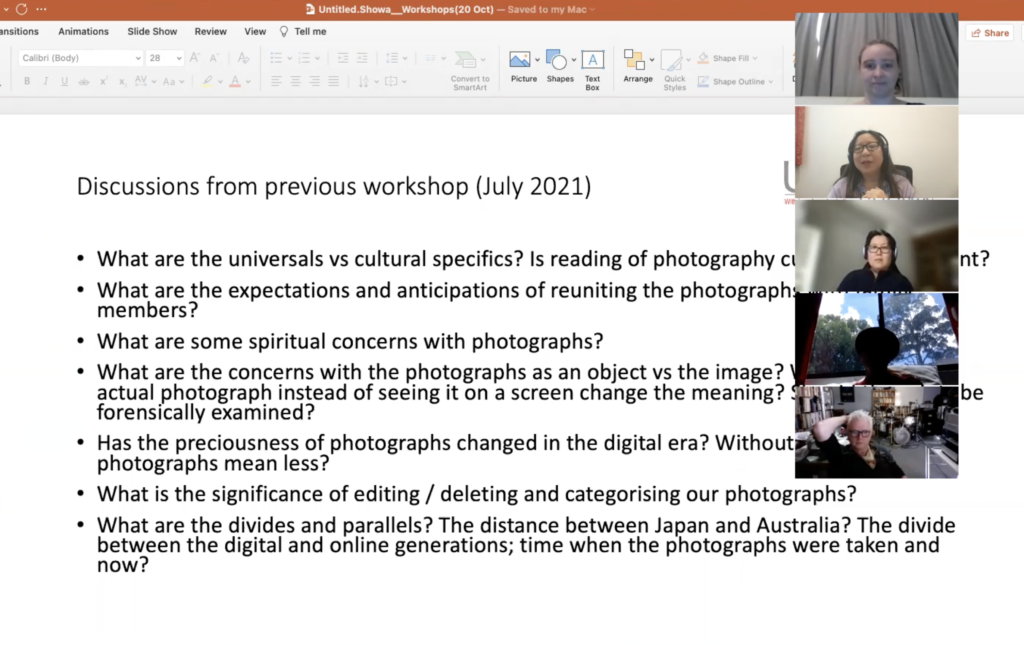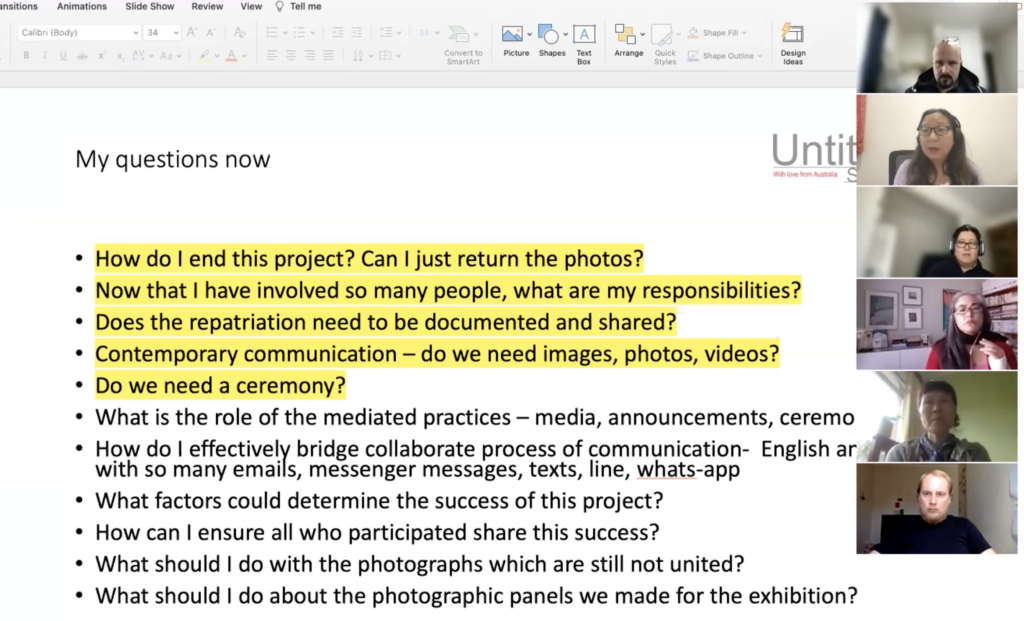Thank you to everyone who attended our online workshops 21 & 22 Oct, courtesy of Nexus Arts and Presented by OzAsia Festival.
We ran four 2-hour workshops with smaller groups, with enough time for everyone to contribute. After a brief introduction to Untitled.Showa, we shared with with participants, the kind of discussions that took place in our previous workshops in July, which were designed to inform us as to our direction there and then. Then we began our discussions by asking the participants to workshop our current dilemmas. The resulting discussions were robust and informative, and many people discussed their own family photographs and circumstances, how it affected their family histories and their own identity making.The two days of workshopping has now begun shaping our next course of action for the Untitled.Showa team. We thank you for your contribution.
These were my own questions (last week):
- How do I end this project? Can I just return the photos?
- Now that I have involved so many people, what are my responsibilities?
- Does the repatriation need to be documented and shared?
- Contemporary communication – do we need images, photos, videos?
- Do we need a ceremony?
Here are some of issues we discussed, including views and thoughts from the participants:
- The tension between citizen history VS official history; how we can read Australia Japan relationship through images.
- Meta data VS privacy – Are historical photographs useless without meta data? Would placing metadata on online images be an invasion of privacy?
- Prints VS digital image – how paper the images are printed on have clues and stories; the relationship between the print (object) and the images (now digitised)
- Cultures and circumstances that celebrate identity making and storytelling through family heritage and memory VS cultures and circumstances that don’t – sometimes people want to forget. Repatriation is not straight forward, and dependant on cultural and circumstantial differences.
- Tension between the desire to tell stories and the real story – would the real story behind the photographs be as interesting as the ones we imagine? Are the imagined stories more interesting? Or is it the search / quest the story? Or perhaps it is the non-story (such as the lack of formulaic story arc) that is what makes this project interesting? Some said it wasn’t the story, but the poetry of the found photographs that is attractive.
- What should the focus of Untitled.Showa be? Some argued it was finding why the photographs were in Geelong, whilst others said returning the photographs was most important, and some said that the importance was in the process of searching, not the outcome of the search.
- What do these photographs do to us – why do we want to refer back to our own circumstances when we see them; a catalyst for memory and or nostalgia; and the haunting that results from finding photographs.
- When asked how this project can end, some participants said through ceremony, kuyo or a celebratory event, others said we need to at least keep the website going, or we need to apply for more funding. Some said we need to go to Geelong and continue our search to find our how the photographs came to Australia, whilst some said they can go to Geelong on our behalf to research. Some said we need a time marker event whilst others said a natural taping off of the project without an ending is desirable.
- The importance of ceremony, and many ideas were discussed, such as kuyo (ceremonial offering to the spirits of the deceased), including otakiage (ceremonial burning) and an exhibition or the originals, allowing families to come and pick them up, or attendees to come and “adopt and original”, Others offered reasons for having a ceremony, such as our yearning permanency, performative acknowledgement as a symbol of much that we don’t know, and to celebrate our collective good will associated with the project.
- Modern day communication and the role of images – ie when we have online communities, we become reliant on images (especially when we are connected through mediums such as facebook and instagram).
- Repatriation of photographs – one family member who is also in the photos, said he already has the same photos, so they don’t want / need another copy; whilst there may be several people photographed together, and if so, who should we return the originals be returned to.
- Ownership of the images / photographs VS custodianship – the repatriation of the images are now no longer going to be with one original owner of the prints (as he or she has probably passed away). Perhaps what we are in search of are custodians of the photographs and not necessarily owners.
- When asked if we need to document the repatriations, especially in the form of a photo or a video, so that so many people involved in this project, having become part of an online community, can see the results of their contribution, some said it wasn’t necessary, others said that documentation was a necessity, some said whenever possible.
- When asked if they photographs can be returned by post or do we need to return them in person, some said we can just post them, whilst others said it needs to be hand delivered so the repatriation can be documented. One participant reminded us that it was the witnessing of the repatriation that counted, and its documentation, a separate concern. Others spoke of honouring connections between people that this project has offered.
The two days of workshopping has now begun shaping our next course of action for the Untitled.Showa team. We thank the participants helping us on our way. Untitled.Showa, after all, is an evolving participatory project, based on our collective good will.
10月21日、22日のオンライン・ワークショップにご参加いただいた皆様、ありがとうございました。
今回は2時間のワークショップを4回行いましたが、4回とも少人数のグループだった為、全員がそれぞれ発言できる時間が取れましたように思えました。ワークショップはUntitled.Showaについて簡単に紹介後、7月のワークショップで行われたディスカッションの内容を参加者の皆さんと共有した後、参加者のみなさんに現在のジレンマをワークショップで話しあえるようにディスカッションを進めました。その結果、多くの人が自分の家族写真やそれに携わる個人の状況、また、それらが家族史や自己のアイデンティティ作りにどのような影響を与えているのかを話し合い、活発で有益な議論となりました。この2日間のワークショップによって、Untitled.Showaチームの次の行動指針が形成されつつあります。ありがとうございました。
先週、ワークショップ時の私自身の質問:
- このプロジェクトをどのように終わらせればいいのか?写真を返却するだけでいいのか?
- これだけ多くの人を巻き込んでしまった以上、私の責任は何か?
- 写真返還の様子を記録し、共有する必要があるのか?
- 現代のコミュニケーション – 画像、写真、ビデオは必要か?
参加者の意見や感想を含め、議論した課題:
- 市民史と公式歴史との間の関係性・写真を通して日豪関係をどのように読み解くか。
- メタデータVSプライバシー – 歴史的な写真はメタデータがないものは意味がなくなってしまうのか。ネット上の画像にメタデータを載せることは、プライバシーの侵害になるのか。
- プリント(物)VS デジタル画像(イメージ)の関係について – 画像が印刷された紙にはどのような手がかりや物語があるのか。
- 家族史や記憶を通じたアイデンティティやストーリーテリングを推奨する文化や環境と、そうでない文化や環境 – 過去を忘れたい状況もあり、写真返還は一筋縄ではいかず、文化的・状況的な違いに左右される。
- ストーリー(物語)を語りたいという欲求と『本当』の物語との間の緊張感 – 写真の背後にある『本当』の物語は、私たちが想像するものと同じくらい興味深いものだろうか。想像したストーリーの方が面白いのではないか。もしかするとストーリーを探す/探求すること自身がストーリーなのか。あるいは、ストーリーではない(例えば、定型的なストーリーアークがないことなど)ことこそが、このプロジェクトの面白さなのではないか。『本当』でも想像でではなく、発見された写真の詩的な部分が魅力的だという意見もありました。
- Untitled.Showaの焦点は何であるべきか。なぜ写真がジーロングにあったのかを探すことが最優先だという意見もあれば、写真を返すことが最も重要だという意見もありました。また、探した結果ではなく、探す過程に重要性があるという意見もありました。
- Untitled.Showa写真を見るとなぜか自分の状況繋げたくたくなるか。記憶や懐かしさのきっかけになる、写真を見つけると心が揺さぶられるなど、写真は私たちに何をもたらすのか。
- このプロジェクトをどのように終わらせたら良いかと言う質問に対して、参加者の中には、セレモニー(儀式)や供養、お祝いのイベントを行う必要はあるという人もいれば、少なくともウェブサイトは続けなければならない、もっと助成金を申請しなければならない、という人もいました。また、写真がどのようにしてオーストラリアに渡ったのか、ジーロングに行って調査を続ける必要があるという意見や、代わりにジーロングに行って調査出来ると言う助言もありました。また、タイムマーカー(区切り)となるようなイベントが必要だと言う人もいれば、終わりのない、自然な形が望ましいと言う人もいました。
- 殆どの参加者がセレモニーの重要性について語り、返還先のない写真の供養、お焚き上げや、原本を展示し、家族・遺族に取りに来てもらう、もしくは展示に来るお客様に原本をアドプト(養子縁組、摂取)してもらうなどのアイディアも出ました。また、セレモニーの重要性について、参加者が集合的善意を祝うため、知らないことの象徴としての承認のため、また、人間は永続性を感じる必要性があるからなどが挙げられました。
- 現代のコミュニケーションと画像の役割 – オンラインコミュニティと繋がると、画像に依存するようになる(特にフェイスブックやインスタグラムなどのメディアでつながっている場合)。
- 写真返還について・写真の返還対象者の中で、同じ写真をすでに持っているので、コピーはいらないと言っている方もいる。また、一緒に写っている人が何人もいる場合は誰に原本を返還すべきか。
- 画像や写真の所有権 VS カストディアンシップ – 写真は一人の元プリント(原本)所有者への返還は不可能となっています(その方はおそらく亡くなっていルので)。すると、私たちが求めているのは、写真の所有者ではなく、写真の保管者なのかもしれません。
- このプロジェクトに関わった多くの人々がオンラインコミュニティの一部となり、自分たちの貢献の結果を見ることができるように、写真返還の様子を写真やビデオの形で記録する必要があるかどうかを尋ねたところ、必要ないという人もいれば、記録が絶対必要だという人もいれば、記録は必要だけど、それが画像である必要はない(文字でも良い)、また、合理的に、可能な限りという人もいました。
- 写真は郵送で返却できるのか、それとも直接手渡しする必要があるのかという質問に対しては、「郵送でいい」という人もいれば、「返還の記録を残すためには手渡しが必要だ」という人もいました。ある参加者は、重要なのは写真返還を目撃することであり、それを記録することとは別だと言っていました。また、手渡しでも、郵送でも、このプロジェクトがもたらした人と人とのつながりが一番大切だという意見もありました。
この2日間のワークショップで、Untitled.Showaチームの次の活動方針が決まりつつあります。参加者の皆さんに感謝の気持ちでいっぱいです。やはり、Untitled.Showaは、私たちの善意に基づいて進化する、参加型プロジェクトなのです。
-Posted by Mayu Kanamori October 2021
−2021年10月、金森マユ投函



Recent Comments